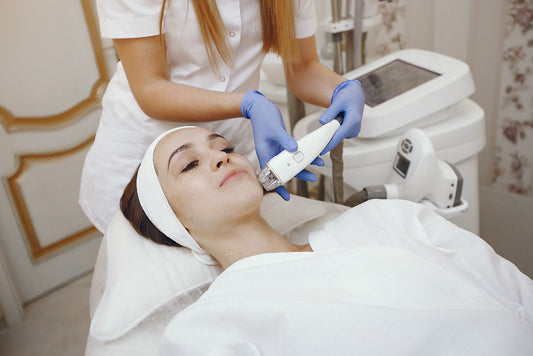Dry eye is a common eye concern affecting millions of people worldwide. It occurs when your eyes do not produce enough oily component of the tear film. This causes a dry eye resulting from your tears evaporating too quickly.
Dry eye syndrome can lead to discomfort, redness, and a gritty eye sensation. However, one of the most concerning symptoms is blurry vision.
In this post, we'll delve into the relationship between dry eye and blurry vision, exploring whether there is a direct connection and what you should know about managing this condition.
Understanding Dry Eye & Blurry Vision
What is Dry Eye Syndrome?


Dry Eye Syndrome, called keratoconjunctivitis sicca, is a chronic eye condition characterized by insufficient tear production, poor tear quality, or rapid evaporation.
Common Symptoms of Dry Eye
Some common symptoms of Dry Eye are as follows:
Dry Eye’s Impact on Vision
Dry Eye Syndrome can lead to blurry or fluctuating vision if left untreated. It may also cause discomfort during activities that require extended visual concentration, such as reading or using digital devices.
Possible Dry Eye Complications
Chronic untreated Dry Eye Syndrome can lead to potential complications including the following:
- Corneal damage
- Increased risk of eye infections
- A diminished quality of life
All of the issues above arise due to constant discomfort and visual disturbances.
What Causes Dry Eye?


The causes of dry eye syndrome can vary. They may be linked to aging, hormonal changes, certain medications, environmental factors (e.g., dry or windy climates), prolonged screen time, and medical conditions like Sjögren's syndrome or rheumatoid arthritis.
Dry eye happens due to issues with your tears, leading to irritation, inflammation, and discomfort. There are certain medical conditions due to which your tear film may change and affect your eyes, including:
- Aging (people over 65)
- Pregnancy and other hormonal changes
- Medical conditions like diabetes, thyroid problems, and inflammation of the eyelid
Moreover, antihistamines, blood pressure medications, and antidepressants can influence tear production. Dry eyes frequently result from reduced tear production or heightened tear evaporation, both of which are prevailing factors contributing to the condition of dry eyes.
Environmental Factors Affecting Your Eyes


Environmental factors can also contribute to dry eyes and blurry vision. Dry and windy climates, air conditioning, and prolonged exposure to smoke or dusty environments can worsen dry eye symptoms, leading to blurred vision.
Digital Eye Strain Causing Blurry Vision
In today's digital age, many people spend long hours staring at screens, whether computers, smartphones, or tablets. This prolonged screen time can exacerbate dry eye symptoms and lead to digital eye strain, which may cause temporary blurry vision.
Can Dry Eye Cause Blurry Vision?
The short answer is yes; dry eyes can cause blurry vision. When the eyes are not adequately lubricated, the cornea and the eye's surface become uneven, resulting in a distorted light focus on the retina. This, in turn, leads to a temporary blurring of vision.
Moreover, the blurriness may become more pronounced and persistent as the condition progresses, affecting day-to-day activities such as reading, driving, and using digital devices.
How Does Dry Eye Cause Blurred Vision?

To better understand the connection between dry eye and blurry vision, it's essential to grasp the role of tears in maintaining ocular health.
Tears are a complex mixture of water, oils, mucus, and antibodies. They lubricate the eyes, nourish the cornea, and provide a smooth optical surface for clear vision.
In a person with dry eyes, the tears lack the proper balance of these components. Consequently, the tear film breaks down quickly, leading to dry spots on the cornea.
These dry spots cause light to scatter rather than be focused accurately, resulting in the perception of blurred or hazy vision.
Blurry Vision as A Common Symptom of Dry Eye
Blurred vision is often one of the first noticeable symptoms of dry eyes syndrome. However, it's important to note that not all cases of blurry vision are caused by dry eyes.
Other factors, such as refractive errors (e.g., nearsightedness or farsightedness) or underlying eye conditions, may also be responsible for vision problems.
Thus, it is crucial to consult an eye care professional for appropriate treatment.
What is Tear Composition & Why is it Important for Your Eyes?
Tears play a crucial role in maintaining eye health. They consist of three layers:
- An oily layer to prevent evaporation
- A watery layer to hydrate the eye
- A mucin layer that helps spread tears evenly over the surface of the eye
Managing Dry Eyes and Blurry Vision
Prevalence of Dry Eye

Dry eye is a prevalent condition, especially among older adults. Studies suggest that over 50% of the adult population experiences some dry eye symptoms.
Tear production tends to decrease as we age, leading to a higher risk of developing dry eyes. It is more prevalent in older individuals, with women being more susceptible than men.
Prevention
Some preventive measures for Dry Eye Syndrome include staying hydrated, avoiding dry or smoky environments, taking regular breaks from screen time, and protecting the eyes from harsh winds or air conditioning.
Consultation
If you're experiencing persistent symptoms of Dry Eye Syndrome, it is crucial to consult a Dry Eye Specialist. A Dry Eye Specialist can perform an eye examination and recommend appropriate management and treatment options tailored to your needs.
Treatment Options
Treatment for Dry Eye Syndrome varies based on the severity of the condition, underlying systemic conditions, the health of your meibomian glands, the amount of measurable oil in your tear film and your blinking patterns. It may include the following:
- Artificial tears
- Prescription Strength Fish Oil Supplementation
- Warm compresses
- Advanced therapies (Lipiflow or Intense Pulsed Light therapy, for example)
- Lifestyle adjustments (e.g., reducing screen time)
- Prescription medications (e.g., anti-inflammatory eye drops)
- Procedures to block tear ducts and conserve tears (in severe cases)
Artificial Tears and Lubricating Eye Drops


The simplest way to treat dry eye syndrome and its associated blurry vision is artificial tears or lubricating eye drops, and let’s be clear, some are better than others. These over-the-counter products can help supplement natural tear production and relieve dryness, thus reducing blurriness. Seek out the recommendation of a trusted Dry Eye Specialist for the best recommendation for you.
Lifestyle Modifications
Specific lifestyle changes can also help alleviate dry eye symptoms and prevent blurry vision. Remember to take breaks from screen time, ensure proper lighting when reading or using digital devices, and avoid smoke-filled or dusty environments.
Taking Advanced Dry Eye Treatments from Experts
Benefit from personalized care customized to your needs and objectives. Visit us at The Med Spa At Scottsdale and Vision Source Rio to enjoy the ultimate self-care experience and take advantage of our Med Spa and Dry Eye Services.
We use Lipiflow technology that uses heat and massage to unclog the glands that produce the soothing oil for your tears. Intense Pulsed Light stimulates the meibomian glands, causing them to create more of the oil that restores comfort to your eyes.
Warm Compresses & Lid Hygiene
In some cases, warm compresses and lid hygiene can help improve tear quality and reduce dry eye symptoms. Cleaning the eyelids gently with a warm, damp cloth or medically treated wipe as prescribed by your Dry Eye Specialist can remove debris and bacteria, promoting healthier tear production.
The Bottom Line
Dry Eye Syndrome can cause blurry vision due to the improper lubrication and nourishment of the eyes. Understanding the connection between dry eyes and blurry vision is crucial in seeking appropriate treatment and management.
If you experience persistent blurry vision or other dry eye symptoms, consult a dry eye specialist for a personalized treatment plan.
You can improve your ocular health and enjoy clearer vision by taking the necessary steps to manage dry eyes.
Posts that might also interest you:
Does Microneedling Help with Melasma?
Tip: If you want to improve the signs of aging on the skin around your eyes, you might be wondering if Botox can be used under eyes? For delicate skin, consider Juvéderm instead, a dermal filler that adds volume and smooths lines around the eyes. Consult a professional to determine the right treatment for you!



 Skin Treatments
Skin Treatments





